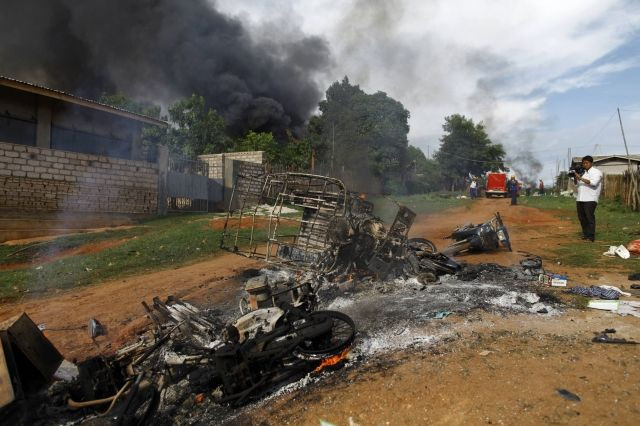Fresh Communal Violence Erupts In Myanmar; Mob Attacks Muslim Targets After Buddhist Woman ‘Torched’

A fresh bout of sectarian violence erupted in Myanmar late on Tuesday, with a mob setting ablaze a mosque, a Muslim orphanage and shops in a town in the country’s northeast region, following allegations that a Buddhist woman was set on fire by a Muslim man, authorities said.
The unrest in Lashio, a city in the state of Shan, subsided on Wednesday with no reports of casualties, Reuters reports.
“The situation in Lashio this morning is calm. There has been no casualty in the incident so far. ... The Tatmadaw [military] and Myanmar Police Force are taking care of security measures,” presidential spokesman Ye Htut said in a statement, according to Reuters. “Religious and social organizations are cooperating with administrative institutions to prevent further violence.”
A curfew was imposed late on Tuesday to bring the situation under control, an official told AFP.
The riots were triggered by a spat between two people, named Aye Aye Win, 24, a Buddhist woman who sold petrol, and a Muslim man, Ne Win, 48, according to Reuters.
The disagreement spiraled out of control and Ne Win poured gasoline over the woman and set her on fire, state-run MRTV television said. The victim has been admitted to a hospital.
Ne Win was arrested, after which Buddhists surrounded the police station demanding him to be handed over. The police refused the demand, and the mob reacted against Muslim targets.
Violent sectarian strife between Buddhists and Muslims has been a common occurrence in the country since last year and has marred the reforms process recently undertaken by the country’s quasi-civilian government.
Tuesday’s incidents followed a recent directive from the authorities in western Rakhine state to impose a two-child policy for Rohingya Muslim families in two townships -- Buthidaung and Maundaw – where 95 percent of the population is Muslim.
The ruling, aimed at keeping population growth among the country’s Muslims in check, does not apply to the region’s Buddhists and came amid accusations of ethnic cleansing against Myanmar’s authorities by human rights groups.
Myanmar’s opposition leader and pro-democracy activist Aung San Suu Kyi condemned the policy on Monday, saying it stood against human rights. Suu Kyi has been criticized for not speaking in defense of the Rohingyas during the country’s ethnic strife.
The new measure was imposed after a commission designated to review last year’s violence attributed the rise in communal tension to a growing Muslim population and recommended family planning and a ban on polygamy for Muslims.
“Under this directive, Bengali [Muslim] men are allowed to have only one wife, and each married couple can have two children. Where there are more than two children, they are considered illegal,” a senior immigration official, who spoke on the condition of anonymity, told Reuters.
Myanmar’s Buddhists use the term Bengali for Muslims, in a reference to the immigrant flow from neighboring Bangladesh.
“As far as I know, there are also plans, according to the recommendations, to encourage Muslim women to go to school and to educate them on the benefits of restricting family size,” the official added.
The U.S. said on Tuesday that it opposed “coercive birth limitation polices” and called on Myanmar to “to eliminate all such policies without delay,” according to State Department spokesman Patrick Ventrell.
© Copyright IBTimes 2025. All rights reserved.






















